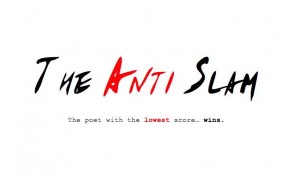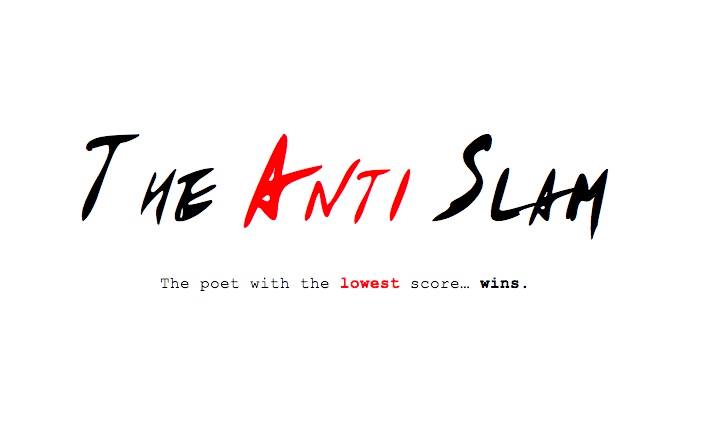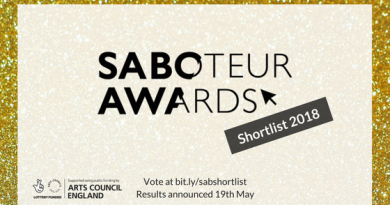Review: The Anti-Slam Oxford
–Reviewed by Claire Trévien–
 23rd January at Arts at the Old Fire Station
23rd January at Arts at the Old Fire Station
The logistics
In 2012 I participated in the inaugural Bullshit conference. The concept was simple: either deal in an ultra-academic way with the silliest topics you can find, or deal with a serious subject matter in a nonsensical format. In other words, it invited academics to parody their own practice, act out their frustrations at typical conference behaviour, and gave me a good excuse to wield my pipe. What made it work is that it used a format and a language we were all thoroughly well acquainted with. Would it have been amusing to outsiders? It’s hard to tell, but if as a non-economist I still found Anirudh Tagat’s deadpan ‘Mine is faster than yours: Analysing Speed of speaking from an economic perspective’ hilarious, then I suspect it would have been.
The same rules apply to the Anti-Slam, a new poetry night launched by Paula Varjack in 2009, which is slowly acquiring rights to world domination. The concept is simple: the poet with the lowest score wins. In direct opposition to a traditional slam event (such as Hammer and Tongue), judges get booed for awarding high scores, audiences are encouraged to interrupt poems with a boisterous ‘we need to talk’ (‘what do we need to talk about?’ threw Neil Spokes back at our heckles), and any poets going over the three minute limit gain extra points. Most importantly, the poets deliberately put their worst foot forward.
The evening was hosted by the lively duo of Dan Simpson and Tina Sederholm, who launched the night with a dual-voiced found poem, with the forbiddingly gothic Dr Werk playing score keeper. Unlike a traditional slam, the judges were not random members of the audience but the pre-elected Sally Outen, Steve Larkin (founder of Hammer and Tongue), and Paula Varjack. While all judges played their parts magnificently, using mock-seriousness to roast the poets, a special medal goes to Sally Outen for her consistently brilliant commentary (including the drawing of a yeti at one point to symbolise her emotions). I have never heard the phrase ‘dimensionally disadvantaged by robots’ used as poetry feedback before, but I do hope it catches on.
The poetry
What makes for a truly awful poem? As was the case with the Bullshit conference, a fruitful route was for the poets to either parody themselves or the ‘field’ with which they were associated. Danny Chivers for instance, well-known as an environmental activist, turned up dressed in a crown of leaves and a hi-vis jacket, issuing hippy-tastic lines of this ilk:
‘I didn’t write this poem
it found me
and it made love to my mind’‘every time you dry your hair
you kill another polar bear’
George Chopping, well-known in Oxford for his whimsical poetry, also came as a parody of himself, dressed in a ‘Gone Fishing’ manner embodying perfectly the part of a muddled over-reaching poet.
Different genres were mercilessly brought to the stage, from Kate Byard’s cringeworthy diary entries ‘Dear diary, life is pain. Aged 12’, to James Webster’s list poem ’10 ways in which my love for you is like the Pokemon Bulbasaur’. Repetitions, a common bugbear in slam poetry, were teased by Pete the Temp’s ‘I need you’, and A. F. Harrold’s more absurdist ‘fish are better than cats’. Love poems of course, were de rigueur, brilliantly executed by Sophia Blackwell in particular, who loves you ‘like super tampons love heavy flow’, leading judge Sally Outen to declare that the poem had not only destroyed her liking for Sophia, but also ‘for the concept of love itself’.
Recreating bad-poet stage behaviour had variable degrees of success, from Pete the Temp’s awkward cough to James Webster receiving a perfectly-timed text. Paul Askew’s dramatic flinging of the microphone across the room did create impact but also cause concerns that he had actually damaged equipment for the night (‘I think I have met you on twitter. And I hate you. I’m giving you a 4 and a steady gaze’ – Sally Outen).
The three poets with the lowest scores were Sophia Blackwell, George Chopping and Danny Chivers, who had to battle it out by creating a brand new poem incorporating three audience prompts: socks, the moon, and Gary Barlow. Sophia Blackwell emerged as a clear winner with her imaginatively earnest poem, incorporating lines such as ‘your face is like a rained on cake’, over Chopping’s peasant-style poem and Chivers’ wild rap.
Conclusion
Judging from the night, a deliciously awful poem cannot look like an accident, it has to be crafted in cold blood. An energetic evening of poetry which, by making us celebrate what we hate, also reminded us of what we love about slam. I look forward to more rowdy instalments of this night in Oxford and beyond.



